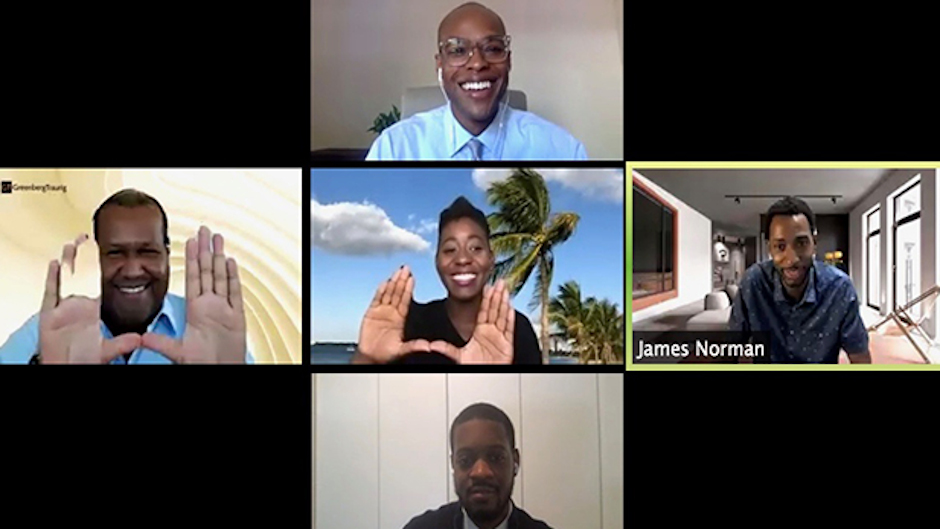Miami Technology Law Club and the Black Law Student Association recently hosted a panel discussion titled “Economics and Control: Representing Black Founders in 2020.” The goal of this event was to highlight the barriers to Venture Capital faced by Black startup founders and how the legal community should respond in light of the murder of George Floyd.
Michael Bailey, President of Technology Law Club and Brandon Newell, Secretary of BLSA, moderated the conversation and were joined by panelists Jaret Davis, J.D. ‘99, Leigh-Ann Buchannan, J.D. ‘99, and startup founder and CEO James Norman. Introducing the topic, Bailey informed the audience that in 2018, only one percent of Venture Capital funding went to Black founders.
Buchanan, the founding executive director of Venture Cafe, then explained the purpose behind Venture Cafe’s economic mobility initiative called Overtown Connect.
“You cannot solve systematic challenges with a program,” said Buchanan. “What we are doing is building an ecosystem to activate six forms of capital to the benefit of underrepresented founders.” She described systemic issues around entrepreneurship that Overtown Connect was designed to address including cyclical poverty, low employment, and disenfranchisement of historically vibrant business communities of color.
The virtual discussion centered on the work that the panelists are currently engaged in to address the systemic barriers to venture funding. Throughout the discussion each of the panelists highlighted the skills that the next generation of legal professionals will need to bring to their practice in order to help address these inequities.
Davis spoke about the startup attorneys role as a relationship intermediary between the founder/CEO and their target business or investor. Reflecting on his own experiences help clients achieve access and validation, Davis said, “25% of the battle is getting [the founder’s] business plan a meaningful read.”
Analogizing the VC community to the Miami business community, he reminded the attendees that Miami is an “intensely relationship driven town” and clients are best served by lawyers who can provide sound legal advice and connection. Davis said that the most important skill that a lawyer can bring to service for underrepresented founders is building a knowledge base of the industry. With respect to protecting founders interests, and with an emphasis on underrepresented founders, Davis encourages his Emerging Technology colleagues to develop a deep understanding of the founder’s industry because, as he said, “the more you know about the product the better you’ll be able to negotiate because you’ll know your leverage.”
Offering a sense of experiences felt in Silicon Valley, panelist Norman, the founder and CEO of the marketing platform Pilot.ly and author of the Harvard Business Review article “A VCs guide to investing in Black founders,” described the importance of Venture Capital and why it may be better for some companies than others.
“Some companies are intensely venture scale companies . . . [the] only way it’s going to scale is through millions of dollars [of funding].”
He reminded the audience that Black founders may be at a particular disadvantage because they may not be able to afford a lawyer who can protect their interests. Agreeing with Davis’ point about understanding the industry and the need for lawyers who can establish leverage in order to increase access to capital for Black founders, Norman said “you could end up with a lawyer that allows the investor to dictate the terms.”
Norman shared a story of a colleague whose company was grossly undervalued during Venture Capital negotiations resulting in the founder having to give up 25% of the company, so it’s important for Black founders to ask themselves before picking a lawyer if “they work with Venture Capital?”
Speaking of the work she’s leading at Venture Cafe and in the community, Buchanan emphasized the need for an infrastructure that creates economic mobility in communities that have been historically disenfranchised. For Davis, this includes coaching and mentoring to help underrepresented founders overcome implicit bias and other obstacles pointed out in Norman’s article. In the end, all panelists agreed that the best way for law students to assist underrepresented founders is to build relationships, network within their communities, and understand the business and technologies that their clients are dealing in.
For more information on the work each of the panelists are doing to address the issue of access to capital see the Transparent Collective and the VCs Guide to Investing in Black Founders, Overtown Connect, Beacon Council’s Connect and Grow Initiative and Venture for America.
Read more about Miami Law’s student organizations.

